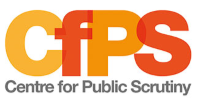Scrutiny guidance: things to think about


Scrutiny guidance: things to think about
(You can download a print version of this document at the bottom of this page)
The Government is preparing new statutory guidance on overview and scrutiny in local government. This will be published in December 2018. The Centre for Governance and Scrutiny has been commissioned by the Ministry for Housing, Communities and Local Government (MHCLG) to draft parts of the guidance.
It is important that the guidance reflects the needs of councils (particularly scrutiny practitioners), of local people, and of local democracy more generally. Those at local level are likely to have the best sense of the kinds of guidance which is likely to help, or hinder, the way that overview and scrutiny operates.
For this reason, the Centre for Governance and Scrutiny and the Association of Democratic Services Officers are working together to encourage officers and councillors to discuss the guidance’s content, and to feed back on what they might need.
We have prepared this document to assist councils, and other interested people, to have discussions at local level that they can feed back to inform the drafting of the guidance.
What’s the background?
The last guidance from Government on scrutiny was issued in 2006. The role of scrutiny has changed significantly since then – just as local government has changed. In 2017, the Communities and Local Government Select Committee conducted an inquiry into overview and scrutiny. The Committee said,
“The role of scrutiny has evolved since its inception. The 2000 Act empowers committees to review decisions made by the executive and to make reports and recommendations for the executive’s consideration. In the seventeen years since, the way in which scrutiny committees perform their function has understandably changed. One such way has been an increase in scrutiny of external bodies, most notably health bodies. Councils have delivered services through increasingly varied partnership arrangements – including contracting to private companies, creating arms-length bodies or working with other public bodies – and scrutiny has responded by adjusting how it scrutinises the issues that matter to local residents.”
Because of this evolving role, the Committee recommended that Government issue revised guidance to councils on how scrutiny should be supported. In doing so, the Committee highlighted the importance that “organisational culture” (how people act and behave, and their values) has on the success of scrutiny.
The Government issued a response in early 2018 in which they committed to producing guidance this year.
What is to be covered?
Government’s view is that each council is best placed to decide which arrangements best suit its own individual circumstances. With this in mind:
- How can the guidance help by making it clear to council executives / senior officers the kind of support that should be given to scrutiny (in a cultural sense)?
- In a more general sense how might the guidance help scrutiny to build a positive relationship with the executive, emphasising the need for scrutiny’s independence?
- Should the guidance highlight the need for a greater profile and respect for scrutiny by the executive?
- Should the guidance go into detail on issues around work planning – recommending focus and prioritisation?
- How can the guidance help scrutiny with access to and use of information?
- Local councillors are best placed to understand the needs of local people, but how can the guidance help scrutiny councillors to ensure that scrutiny is supported to engage with the public in this way?
- How can the guidance help scrutiny more generally to develop a positive profile for itself at local level?
- Are there sections / elements that you think might be particularly helpful – or unhelpful?
There are three specific issues where Government is keen that the guidance provides some further detail. These are:
- Scrutiny of “external bodies” (this might be bodies operating under contract, commissioned partners, alternative delivery vehicles, more traditional partners and so on)
- Access to information (access to, and use of, information effectively by scrutiny having been a challenge for many practitioners)
- Scrutiny of financial resilience and sustainability of councils (recognising the recent, and continuing, pressures on the sector and scrutiny’s role in helping to understand them)
What will the status of the guidance be?
The guidance will be statutory guidance, issued under section 9Q(1) of the Local Government Act 2000. This means that councils will have to “have regard to” the guidance in the way that they work and the decisions they make. The phrase “have regard to” has a particular legal meeting, which is essentially that a body subject to such guidance has to have a clear reason for departing from it. Your council’s Monitoring Officer is the best person to provide further advice on what this might mean for how you interpret the guidance locally.
The status of the guidance means that it is particularly important that it is supportive of arrangements that promote and support strong independent scrutiny however that might be carried out – and that it does not risk putting in place barriers, however inadvertent, to this happening. Hence the importance of speaking to practitioners.
How can you make your voice heard?
Scrutiny practitioners have already – through the Select Committee’s inquiry – had an opportunity to comment and discuss a range of issues relating to the function and its future. Government has access to the fruits of this work, so we are not suggesting that practitioners take this opportunity to talk again about scrutiny in general terms – hence our outlining of the main issues in the section above.
We are suggesting that you talk over these issues in a range of ways:
- At a regional scrutiny network meeting. There are a number of regional scrutiny networks, which meet periodically. The Centre for Governance and Scrutiny can provide information about forthcoming meetings in your area.
- At an ad-hoc meeting which might draw together practitioners from an area where there is not currently a scrutiny network. So you might want to get together with colleagues from neighbouring councils to talk things through.
- Through the membership networks within the Association of Democratic Services Officers.
- At a formal scrutiny committee meeting, or a workshop that you organise in your own council.
Timescales for this work are quite challenging. Government is seeking to draft the guidance in early October. For this reason, the conversations above will need to happen over the course of September.
You can send your thoughts directly to Ed Hammond (Director of Research, CfGS) at ed.hammond@cfgs.org.uk and Graham Knapper (LG Stewardship, MHCLG) at graham.knapper@communities.gsi.gov.uk




